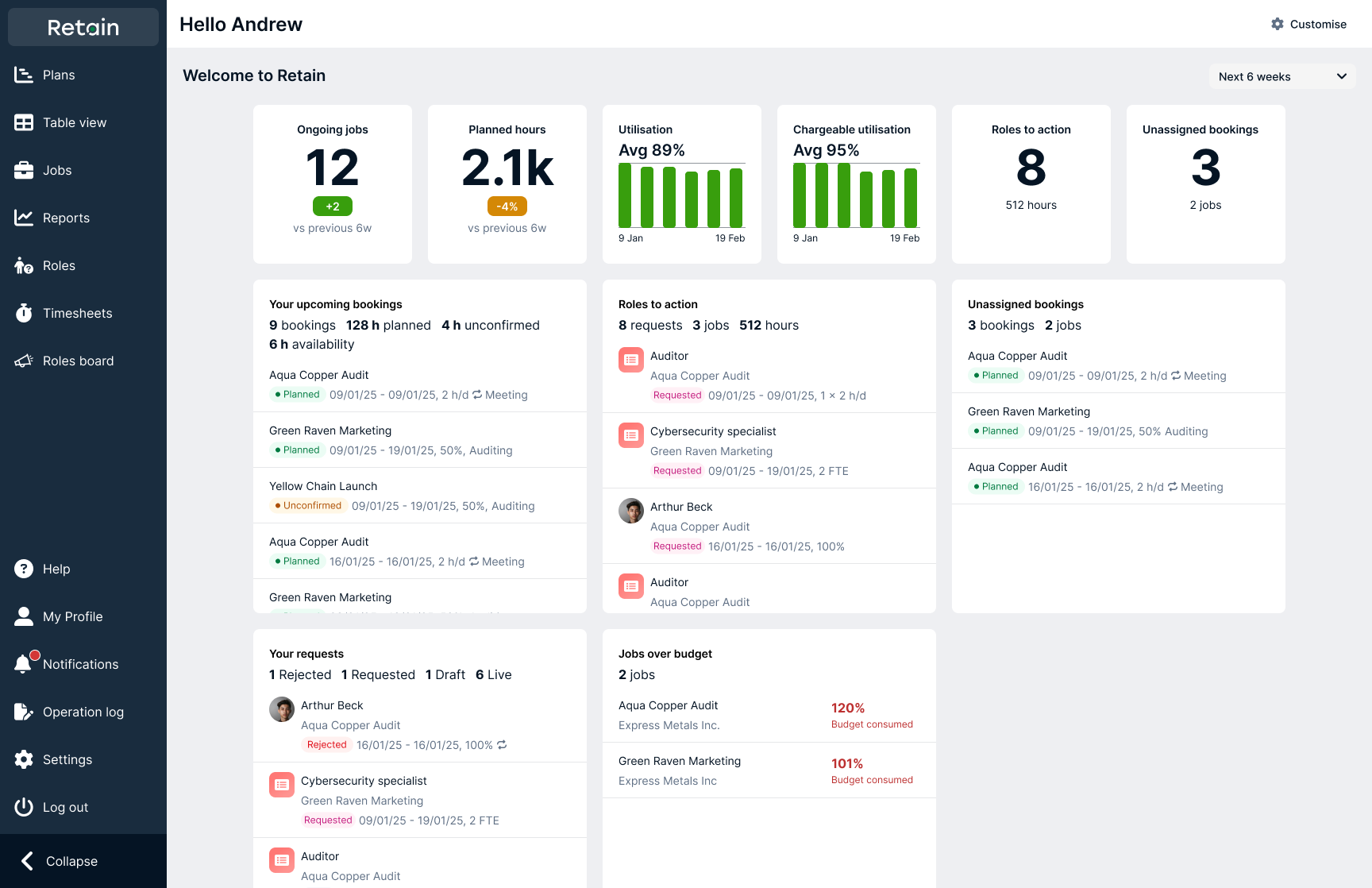Human resources is a term that shows up in almost every project plan, time-tracking tool, and resourcing conversation. But increasingly, it’s also a point of tension. On one hand, “resources” is practical shorthand, especially when you’re juggling timelines, budgets, and skills across multiple projects. On the other hand, it can feel a bit impersonal.
So, where do we go from here?
In this blog, we unpack the meaning behind the term “resource” in a workplace context; why it exists, why it bothers some, and how businesses can strike a better balance between objectivity and empathy. We’ll also look at how resource planning tools can help teams make smarter, more people-first decisions, without losing the clarity that planning demands.
Why people are called resources?

In project-based work, especially in professional services, using the term resources helps create a common language to plan objectively and make better decisions under pressure.
When you’re managing multiple engagements, you need to quickly understand who’s available, what they’re skilled at, and where they’ll add the most value. Referring to people as “resources” can simplify that process. It allows managers to zoom out, assess capacity, and align skills with demand, without getting lost in job titles or team boundaries.
It’s also a way to reflect value. Unlike physical tools or systems, people bring experience, judgement, creativity, and insight. This is especially true in client-facing roles where success hinges on relationships. Your people are your most important resource.
A skilled team member can anticipate roadblocks, suggest more efficient ways of working, and spot client needs others might miss. These human qualities drive outcomes that no other input—time, budget, software—can replicate.
When “resource” misses the mark

For many, the word resource feels a bit reductive. It might imply that people are inputs to be used and managed, rather than individuals with unique skills, goals, and needs.
That language matters. In a people-focused business, the way we talk about teams shapes how we treat them. When employees are referred to as resources too often, it can unintentionally undermine morale, culture, and trust.
Here are some common objections:
It feels dehumanising
The term “resource” can strip away individuality, reducing people to what they do, not who they are.
It implies disposability
Resources can be depleted, replaced, or reassigned without much thought. That doesn’t reflect the investment—or value—people bring to your business.
It affects motivation and morale
When employees feel like line items rather than valued contributors, engagement suffers. People want to be recognised for their unique contributions, not just booked on projects.
It oversimplifies talent
Labels like “resource” often overlook the nuance of someone’s capabilities, potential, or career aspirations. That can lead to mismatches in project work and missed opportunities for growth.
For these reasons, many organisations are moving away from purely transactional language. They refer to people, team members, or colleagues, especially in communication that’s employee-facing.
Why referring to people as resources is okay

We’ve already discussed why people are considered resources in some businesses, but here are the reasons why they think it’s okay:
Strategic management
Simply put, it can help you manage your workforce strategically. By understanding the skills, knowledge, and experience of your employees, you can assign them to projects or tasks that align with their strengths, which can lead to increased productivity and job satisfaction, which are crucial for successful project management.
Effective planning
Using the term resource is useful when planning and managing projects, especially if your company juggles multiple projects simultaneously. By considering employees as resources with specific skills and experience, your managers can plan projects more effectively and allocate resources more efficiently.
Resource allocation
Your business can make informed decisions about which projects to pursue, and which resources to allocate to each project or task, by understanding the capabilities and availability of your employees.
Objectivity
Referring to employees as resources can help your managers maintain an objective and business-focused perspective when making decisions about their team. Also, managers can make decisions based on business needs rather than personal relationships or biases.
Increased productivity
By ensuring that your employees are assigned to tasks and projects that align with their strengths, your business can create a more engaged and motivated workforce.
What does human resources mean?

The term human resources has been part of business language for decades. It refers both to the people who work in an organisation, and to the function responsible for managing them such as hiring, onboarding, training, supporting, and developing employees throughout their careers.
At its core, the phrase recognises people as a vital asset to the business. Just as you’d manage financial or operational resources carefully, human resources, like your team’s time, skills, and experience, need to be planned, nurtured, and aligned with strategic goals.
But the word resource isn’t meant to suggest that people are interchangeable. In modern organisations, HR is about enabling performance, supporting wellbeing, and building a workforce that can grow with the business.
A people-first approach to human resources means:
- Understanding individual strengths and aspirations
- Investing in development and career growth
- Tracking and planning around skills, not just roles
- Creating conditions for people to do their best work
The best HR teams—and tools—recognise that people are not just “resources to be deployed,” but partners in the business’s success. And as workforce planning becomes more data-driven, that distinction becomes even more important.
How technology can support people-first resourcing

Balancing the objectivity of resource planning with the individuality of your people is no small task, especially when you’re working across multiple projects, skill sets, and timelines. That’s where technology makes the difference.
Modern resource planning platforms help you move beyond spreadsheets and gut feel. They give you live visibility into who’s available, what they’re good at, how they’re developing, and where they’ll add the most value.
The most effective platforms—like Retain Cloud—bring together the critical pieces:
● Skills-based planning: Go beyond job titles. Match people to projects based on verified skills, recency of use, and relevant experience.
● Cross-team visibility: Break down silos across departments. Whether it’s Audit, Tax, or Advisory, everyone works from the same live view of capacity and demand.
● Development tracking: See not just what someone can do today, but where they’re building toward. Use that insight to plan stretch assignments and support growth.
● Smart scheduling: Use AI to suggest the best fit for each role based on capability, preferences, and working style.
● Real-time performance insights: Understand utilisation, forecast capacity, and identify potential resourcing gaps before they become problems.
Rather than removing the human element, the right platform puts it front and centre. It gives your teams the data they need to make informed, empathetic decisions, ensuring that the term “resource” reflects value.
➡️ Want to see how Retain Cloud brings this to life? Book a personalised demo and start building a more people-first approach to planning.

